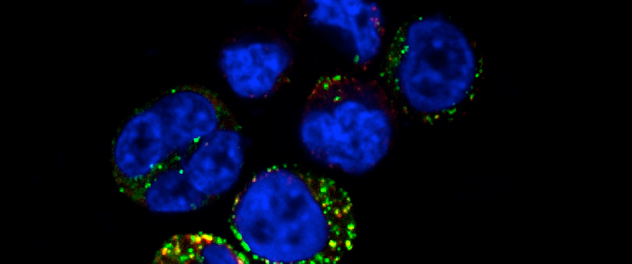-

Abdominal scan shows how fast the stomach empties
Dr. Acosta's Precision Medicine for Obesity Lab uses abdominal scans from a gamma camera to evaluate how fast the stomach empties solids and liquids after radiolabeled meal ingestion.
-

Attacking the epidemic of obesity from the inside out
The Acosta Lab studies the mechanisms behind food intake regulation and weight to develop individualized therapies for obesity.
-

Studying the colonic epithelium
Dr. Acosta's lab used immunofluorescence confocal microscopy to show glucagonlike peptide-1 (GLP-1; green)-producing enteroendocrine L cells (blue) within the human colonic epithelium.
-

Satiety hormone research
NCI-H716 cells, an in vitro model of human enteroendocrine cells, enable research on satiety hormones GLP-1 (green) and PYY (red), as shown in this immunofluorescence confocal microscopy image from the Precision Medicine for Obesity Lab.
-

Discovering how the brain controls appetite
Dr. Acosta's lab uses MRI to study the basal ganglia level of the brain to better understand appetite controls.
Overview
Andres J. Acosta, M.D., Ph.D., leads Mayo Clinic's Precision Medicine for Obesity Lab. His team is addressing the escalating global obesity epidemic by developing new individualized treatments for obesity.
Current strategies for treating obesity rely on a one-size-fits-all approach, even though people with obesity have many different processes and factors associated with this condition. As a result, people's responses to obesity medicines, as well as to diet and lifestyle changes, continue to be hit-or-miss, with wide-ranging effectiveness and outcomes.
The Precision Medicine for Obesity Lab focuses on understanding and characterizing the complex differences among people with obesity. The lab's recent studies have found several unique subgroups among people with the condition. These groups are known as obesity-related phenotypes. People with each obesity-related phenotype have unique changes in their bodies that are associated with different responses to obesity medicines.
Dr. Acosta's research team works to understand these unique obesity-related phenotypes. The lab also aims to explain the complicated physical factors, processes and mechanisms that lead to the development of each distinct phenotype. The goal is to introduce new interventions for obesity that are personalized for each patient and that make weight-loss medicines more effective.